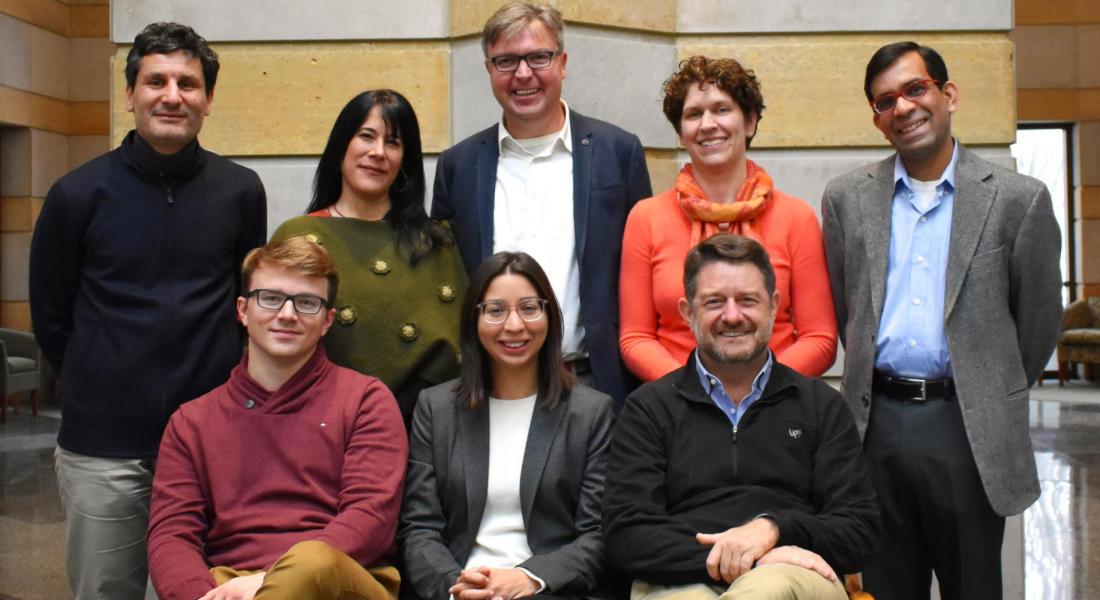
The Kellogg Institute for International Studies is welcoming four new visiting fellows this semester, including a Chilean politician and a former student activist from Benin who was jailed for his pro-democracy views.
The spring visiting fellows – whose work encompasses governance, urbanization, inequality, and education, among other topics – bring the number of scholars taking part in the residential fellowship program this academic year to one dozen.
“This diverse group of scholars brings a depth of academic knowledge and a breadth of life experiences that will make them an integral part of the Institute’s intellectual community,” Director Paolo Carozza said. “We couldn’t be more pleased that they’re here, and we look forward to their insights and contributions to the Institute’s work.”
The spring visiting fellows are:
- Claudio Orrego, a Chilean lawyer, politician, academic, and international consultant. He served two terms as mayor of Peñalolén, one of the country’s largest and most diverse municipalities, located in the Santiago Metropolitan Region. He was a presidential candidate in 2013 for the Christian-Democrat Party, and will study governance, democracy, and the challenges facing public leaders in an urbanizing world.
- Ben Phillips, the Hewlett Fellow for Public Policy and co-founder of the Fight Inequality Alliance, an international coalition uniting major non-governmental organizations, unions, and social movements to address inequality. His research will address how to eradicate inequality and the roles of groups including international NGOs, social movements, and faith-based organizations in effecting change.
- Kaushik Sunder Rajan, an anthropologist at the University of Chicagowhose work lies at the intersection of anthropology and science and technology studies. While at the Kellogg Institute, he will conduct an ethnographic study of the judicialization of health, or how demands related to public health are placed upon the state through judicial intervention, in South Africa, with plans for a comparative look at India in the future.
- Leonard Wantchekon, a political science professor at Princeton University who studies political and economic development in Africa. A native of Benin, he escaped from jail after being arrested for his political activism and later founded the African School of Economics. During his fellowship, he will conduct research on projects that address experimental research on institutions, transportation infrastructure and regional diversity in Africa, and education and intergenerational social mobility.
They join a cohort of fall and full-academic year visiting fellows whose areas of study include political science, anthropology, sociology, and political economy. Those scholars, and their projects, are:
- Maria Paula Bertran (Fall 2018), the Brazilian Fulbright Distinguished Chair in Democracy and Human Development and an associate professor and chair of Ribeirão Preto Law School at the University of São Paulo.Predatory Lending and Social Movements: Brazil and US Human Underdevelopment Focusing Real Estate Debt.
- Betsey Behr Brada (2018-2019), an assistant professor of anthropology at Reed College. The Global Health Frontier: AIDS, Pedagogy, and Moral Transformation in Botswana.
- Graeme Gill (Fall 2018), professor emeritus of government and international relations at the University of Sydney. Bridling Autocrats: Limiting Executive Power in Authoritarian Polities.
- Maximilian Goedl (2018-2019), postdoctoral researcher/lecturer at the University of Graz. Disentangling the Eurozone Crisis: Government Default and Bank Credit in a Business Cycle Model.
- Victoria Paniagua (2018-2019), political scientist at Duke University. Elites, Portfolio Diversification, and the Politics of Development and Redistribution.
- Diego Sanchez-Ancochea (2018-2019), professor of the political economy of development at the University of Oxford. Mind the Gaps: Exploring the Interactions Between Political and Economic Inequality in Latin America.
- Ignacio Walker (Fall 2018), Hewlett Fellow for Public Policy. Faith and Politics: Reflections of a Catholic Legislator.
- Verónica Zubillaga (2018-2019), associate professor of sociology at the Departamento de Ciencias y Tecnologías del Comportameinto, Universidad Simón Bolívar. Women’s Responses to Urban Violence and Militarization in Caracas Barrios: Ethnography and the Forging of Memory.
Meanwhile, Abby Córdova will be in residence at the Kellogg Institute this semester as a guest scholar and in the fall as a visiting fellow. Córdova is an assistant professor of political science at the University of Kentucky who studies public opinion and political behavior in Latin America.





